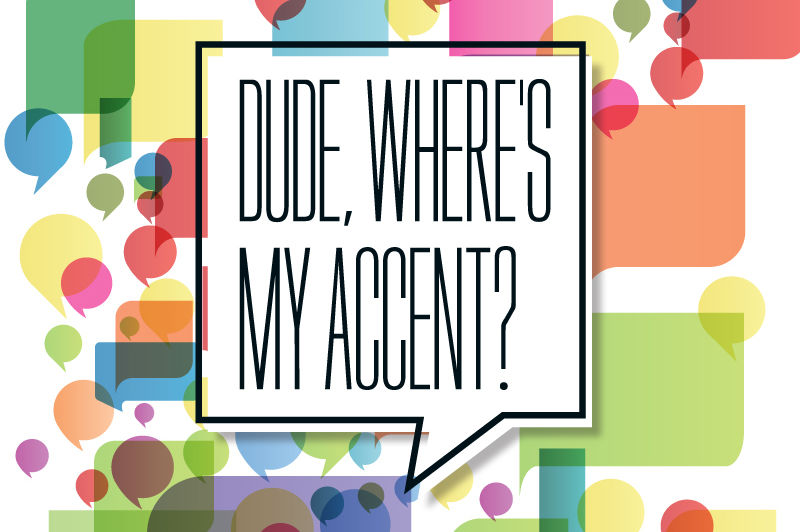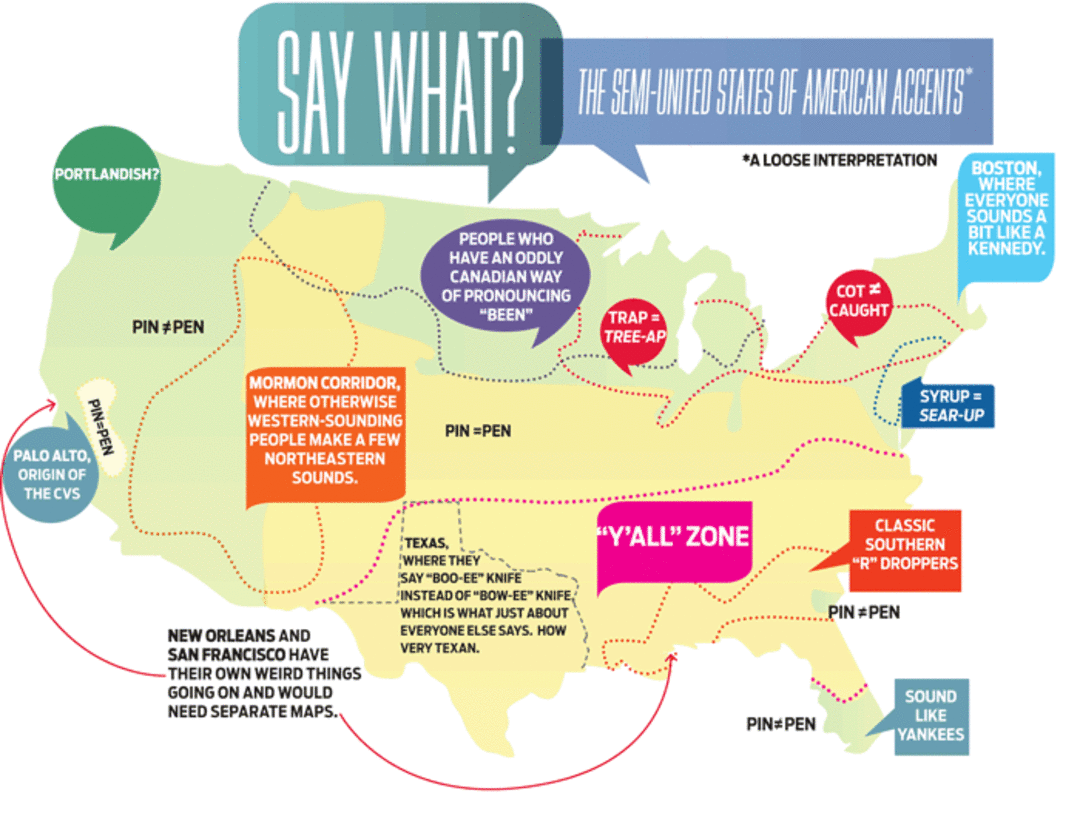
Dude, Where's My Accent?
On an autumn afternoon at a downtown Starbucks, Jeff Conn asks me to meow like a cat.
“Go ahead,” the linguist says. “Just say the word meow.”
Conn, 39, teaches at Portland State University. An expert in phonetics and dialects, he spends a lot of time listening to people—not so much what they say, but how they say it. He runs me through some more words (sit, set, sat, dude, love, day, Tracy Barry), listening to my vowels. Linguists like Conn stalk vowels the way bird-watchers pursue shrikes—he can detect a raised Canadian diphthong (that’s the one that turns about into aboat) from across a room. He knows that Texans can’t tell a pin from a pen and that Detroiters turn a trap into a tree-ap.
These days, he’s paying special attention to the way Portlanders pronounce words like caught, dude, and no. He’s monitoring those words for signs of a phantom invasion—he wants to know if your dude sounds like di-ood, if your caught sounds like cot, if your no sounds like ne-ow.
If any of those mutations is taking root in your speech, you could be part of a transformation known as the California Vowel Shift. First observed in the Bay Area, the phenomenon appears to be spreading. Some linguists believe that CVS is burrowing into Portlanders’ speech. Others (like Conn himself) think the future of how we talk is more complicated.
At first blush, it’s hard to think of anything more trivial than how a given person—or city—says the word egg. But vowels are a sort of linguistic barometer, yielding clues to both the past and future of everyday language. Indeed, how we pronounce the humble vowel may eventually even influence how we see ourselves.
People have always judged one another by how they speak. The Greeks coined the word barbarian to describe people whose language sounded (to the Greeks) like ba-ba-ba-ba. The Bible’s book of Judges relates how victorious Gilead identified defeated Ephraimites via the Hebrew word shibboleth: soldiers killed anyone who pronounced it sibboleth. Even if massacres aren’t involved, accents help signal education, status, background, possibly even sexuality.
American English features about 15 distinct vowel sounds, which linguists categorize according to where in the mouth they originate. Eeee is a high-front sound; aaah is low-back. Say eeee and then drop your jaw, the sound changes to awww. Purse your lips, and you get oooo. Say meow—out loud, please, especially if you’re reading this in a coffee shop—and you’ll glide through roughly 10 different vowel sounds.
In English, vowels convey meaning—think about the sonically subtle but vital differences between beat, bit, bet, bat, bought, but, bait, bite, bout, boat, and boot. Change the vowel, and you’re saying a different word. So if you begin pronouncing a vowel a little differently—by moving it back and lower in the mouth, for example—your bat will begin to sound like your bought. The only way to preserve the distinction between the two words will be to change bought, too. Vowels in English jostle each other like children in a crowded elevator. If one shifts position, the next must shift as well. Eventually, in imperceptible increments, a whole language can change.
This happened in England starting about 1350, when something called the Great Vowel Shift took hold. Earlier, green sounded more like grain; root was more like rote. Within a couple of centuries, virtually all of the long vowels of English transformed. This is why Chaucer’s original, 14th-century Canterbury Tales—“Whan that aprill with his shoures soote / The droghte of march hath perced to the roote”—look and sound bizarre now, while Shakespeare’s 16th-century writing seems much more “modern.” The shift also helps explain why English spelling is such a hot mess.
A Stanford University linguist named Penny Eckert noticed a similar shift among Palo Alto teenagers after she moved to California in 1985. No was turning into ne-ow even as dude went from dood to di-ood. Black began sounding more like block. Two vowels in the low-back area—those in cot and caught, which sound very different from one another on the East Coast and elsewhere—were merging into a single sound.
Eckert and her colleagues subsequently documented the phenomenon’s journey from Bakersfield to San Jose, while other researchers have observed it as far north as Alaska. “The shift is happening,” says Eckert. “No question.” When something as fundamental as language in the nation’s most populous state (and world’s 10th-largest economy) changes, that change resonates. In the Saturday Night Live soap-opera spoof “The Californians,” the show’s cast revels in talking like stoners afflicted with sunstroke.
Teenagers’ early adoption is particularly significant. Kids are the shock troops of language, often deliberately adopting obscure slang and funky pronunciation to distinguish themselves from their terminally lame parents. Over time, their speech inevitably becomes the new normal. “Languages tend to change systematically,” says Kara Becker, assistant professor of linguistics at Reed College. “The oldest speakers represent the older forms. The youngest tend to predict the coming forms.” Becker studies how language both reflects and affects society. She wrote her doctoral dissertation on New York’s infamous Lower East Side accent, where coffee sounds like cawfee and bought is bowt. “Speech is not just about communication,” she says. “We use accents to construct our identities, to mark ourselves as belonging to a certain group.”
Sometimes, people cherish and flaunt their New Orleans drawl or their highland burr. In other instances, people worry that their speech marks them as rednecks, nouveaux riches, or Long Islanders—a phenomenon known as linguistic insecurity. Either way, people tend to adopt certain accents for discernable reasons. When it comes to the CVS, California’s image as a lotusland of surf and sun may be pushing vowels around nationwide. In a 2011 article in the journal American Speech, researcher Robert J. Podesva argued that Californian speech is markedly common among gay men, for instance. “The CVS indexes ‘fun’ and ‘laidback’ meanings,” he wrote. A linguistics blogger (they exist!), following up that research, tracked down the Californian accent as far away as New York.
To put it in terms a 1980s Palo Alto teenager might understand, if we think a certain way of talking sounds rad, we’re likely to mimic it.

Image: Nomad
For many years, linguists believed that the whole West Coast spoke with a single, homogenous accent. The California Vowel Shift, however, prompted a closer look. Last year, Becker and a group of Reed linguistics students set up a table at the Sylvania campus of Portland Community College and interviewed 35 native Oregonians, listening to their vowels.
They are still sifting data, but preliminary results are emerging. Most respondents pronounced cot the same as caught, just as those Palo Alto teens started doing 30 years ago. Most also demonstrated the “fronting” of back vowels—the infamous di-ood. So far, so Californian. But then Becker’s team looked for the third ingredient of CVS: a mutation that turns a Bay Area kegger into a kagger.
Sometimes, respondents followed the CVS pattern, making trap more like trahp and black like block. But in other cases, these vowels seemed to be moving in the opposite direction. Many Portland speakers made keg like kayg (rhymes with plague), and egg like ayg—a feature that PSU’s Conn and other linguists have identified as unique to the Pacific Northwest.
In other words, Portland may be in the first stages of developing its own distinctive accent. Becker believes that could be due to our long-held desire to separate ourselves from the colossus to our south. “If you think California is all surfer dudes and Valley girls,” she says, “you might not want to speak like exactly them.”
The future of the Portland accent—or even if there is one—is very much in doubt. “You could line up 100 Portlanders and not hear the same accent twice,” says Conn, the PSU linguist. “But there would also be similarities.” Whether our speech apes the Bay Area or branches off in its own direction, the changes will be part of a much larger story of North American English. Even as Californians sound more and more...Californian, Rust Belt residents are giving an increasingly distinctive spin to their own vowels in a phenomenon known as the Northern Cities Shift. There’s also a separate, and contrary, Southern Shift. (Don’t even get us started on Canadian Raising.)
These changes may seem subtle. But sustained over centuries, little quirks of speech—the ah in caught, the old rivalry between soda and pop—can spin out into bigger differences. After the collapse of the Roman Empire, Latin became Spanish in Madrid, French in Paris, and Portuguese in Lisbon. Americans and Brits once sounded much the same—in fact, linguists believe that the modern American accent is actually closer to the way people on both sides of the ocean spoke before the Revolution.
Of course, those changes came about because of separation. California and Portland will always have each other. They’ll give us movie stars and strange body-hair trends; we’ll give them whimsical indie bands and real estate bargains. What remains to be seen is where Portland falls in grand scheme of how Americans talk: as a di-ood-erific colony of the Golden State, or a linguistic free city, with a dialect all its own. Or maybe an opportunistic hybrid would best reflect Portland’s eclectic pride. We could fry up California’s cool-sounding behcon, but crack our own aygs.
